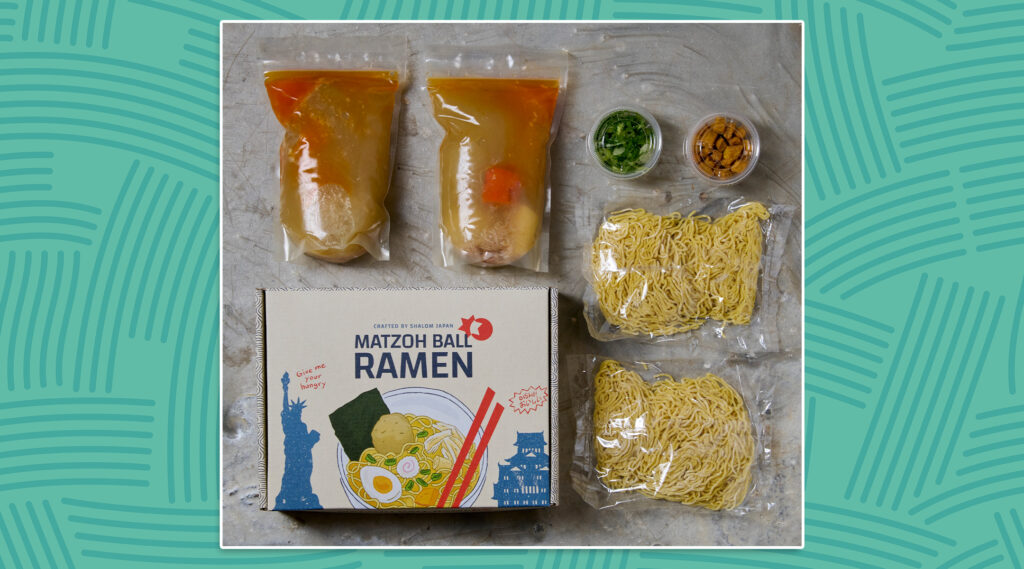For most of Jewish culinary history, anyone seeking to make matzah balls faced one major choice: sinkers or floaters?
In the 20th century, with the advent of home-cooking conveniences, another decision joined the one about density: from scratch or from a box?
Now, in an era of niche food products, home cooks have a new set of matzah ball options: freeze-dried, flash-frozen, and flecked with furikake, the Japanese seasoning mix including seaweed and sesame seeds.
As soup season descends, a growing number of new efforts are underway to remake Jewish culture’s most iconic comfort food for the harried home cook. Both legacy brands and new startups are getting into the matzah ball game, aiming to simplify production so that a bowl of steaming, tasty soup can always be just minutes away.
Nooish, which hit shelves in September, is a just-add-hot-water option that comes in a paper ramen container, emblazoned with iconography and lettering that its designer says subtly reflects American Jewish visual culture.
Shalom Japan, the Brooklyn Jewish-Japanese fusion restaurant, has recently launched a mail-order matzah ball ramen kit that allows home cooks to replicate its signature dish.
And even Manischewitz, the vaunted kosher brand that launched in 1888 as a matzah producer, has innovated on its longstanding line of box mixes. Now, Manischewitz matzah balls can be found in many supermarkets’ freezer sections.
“I don’t know if everyone is ready to make a matzah ball or is able to, especially the younger demographic,” said Shani Seidman, chief marketing officer of Kayco, the owner and distributor of Manischewitz. “But if you have it readily available in the freezer, you can plop it into any soup.”
The trend has prompted debate among Jewish food icons, many of whom have their own recipes and traditions for the soup that is a mainstay of Shabbat and holiday tables from the onset of cozy season until Passover in the spring.
Calling matzah balls “the supreme Jewish comfort food,” Joan Nathan, the matriarch of the Jewish food world, said she believed the readymade options are unnecessary and likely subpar. (Her own recipe calls for fresh ginger and nutmeg and results in balls that are neither overly dense nor especially light.)
“Matzah balls are so easy to make. They don’t take any time at all,” she said. “It probably takes less time to make them than to buy them.”
But Adeena Sussman, author of the cookbooks “Sababa” and “Shabbat,” said she understands why some cooks would turn to readymade options. Her own family is divided: Her mom, Steffi, was firmly planted in the box-mix camp as she prepared food for 60 people at two Passover seders every year. As an adult, Sussman has taken to making her own family’s matzah balls from scratch, sharing a recipe in her collaborator Chrissy Teigen’s cookbook that calls for seltzer and black pepper.
“Not everyone has a great matzah ball recipe or the wherewithal to make matzah balls,” Sussman said. “It’s a hard time to be a Jew. Even a little Jewish comfort, by adding hot water to a matzah ball mix, I am all for it. I think it’s great.”
Some of the new products offer a spin on the classic dish.
Shalom Japan’s mail-order kit includes two soup packets that come with matzah balls, packets of noodles, scallions, soup mandels and a spicy sauce. Consumers need only to boil water, stick in the packets of soup to heat them, remove the packets and put the noodles into the same boiling water to generate their own version of matzah ball ramen. (Add your own furikake.)

Shalom Japan, the Brooklyn Jewish-Japanese fusion restaurant, launched a mail-order matzah ball ramen kit. (Courtesy)
“That dish is the dish people think of the most when they think of our restaurant,” said Aaron Israel, Shalom Japan’s co-founder with his wife Sawako Okochi. “It helps define us.”
Sarah Nathan, the creator of Nooish, meanwhile, touts the “clean” ingredients in her product — no MSG, less salt than other instant soups on the market, and high-end flavorings from Burlap and Barrel, the Jewish spice startup.
As a busy executive at food brands such as Chobani and Just Date, Nathan, 37, often found herself turning to instant soup when she didn’t have time to cook from scratch. But after helping plan a virtual Jewish food festival during the pandemic, she realized that none of her go-to brands reflected her own culture.
“Why can’t I get matzah ball soup instantly? Why does it have to take over an hour?” Nathan recalls thinking. “It’s so hard to make, hard to get and it’s expensive. But it is also a love language.”
This fall, after years of testing and product development, she brought Nooish to the market. The vegetarian, certified kosher soups come in packages of four for $40 or 18 for $125. Its name is a mashup of “new,” “Jewish” and a dose of advice from a successful entrepreneur.
“Gwyneth Paltrow said brands with two o’s — like Goop — sell better,” said Nathan, who worked at American Jewish University early in her career and now lives in Chicago.
Sussman sampled the soup and said she was initially skeptical because of its appearance — until she added hot water.
“They are like space food, freeze dried. When you look at it, it is dry and powdery with flecks of dried herbs. Until it is rehydrated you have no idea what is going to happen,” she said. “I was pleasantly surprised with the matzah ball. It was better than I thought it would be.”
In the first week after Nooish launched, Nathan said she sold mostly to friends and family. In the second, she said, orders poured in from around the world, including from places where cooking is impractical or impossible — including on a naval ship. Now, she’s touting its utility for organizations that want to send soup to their constituents but want to avoid ordering pricey restaurant delivery or setting up temporary distribution centers from their own kitchens.
The company’s social media is highlighting a comment from a Hillel employee who wrote, “Our Hillel sends soup to students who are not feeling well. Nooish has revolutionized how we do it — no more freezers, no more defrosting, no more complicated requests from campus dining.”
For Sussman, that type of experience is perhaps the greatest appeal of at-home matzah innovations such as Nooish.
“A convenience food that ties into super great comfort food memories and associations can fill a hole for people,” Sussman said. “Can’t you see every mom sending it to their kid in their college dorms? I would want to.”
Support the Jewish Telegraphic Agency

Help ensure Jewish news remains accessible to all. Your donation to the Jewish Telegraphic Agency powers the trusted journalism that has connected Jewish communities worldwide for more than 100 years. With your help, JTA can continue to deliver vital news and insights. Donate today.









 English (US) ·
English (US) ·